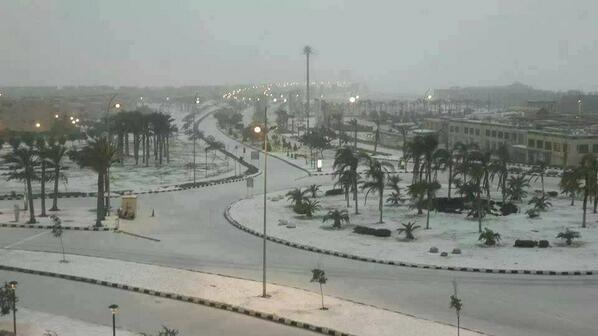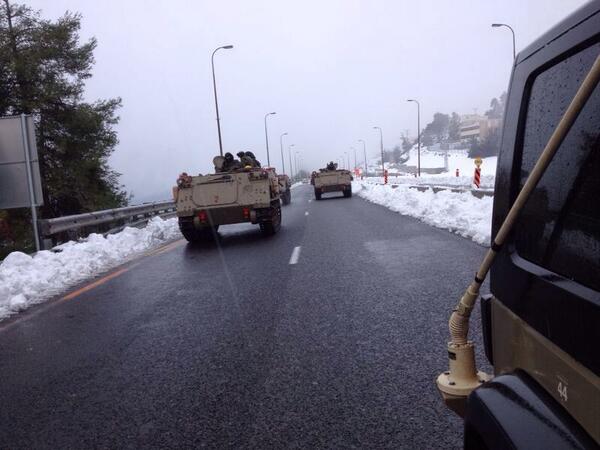Police closed off access to Jerusalem via Route 1 due to ice on the road early Sunday morning. The highway from Tel Aviv had been open for a few hours Saturday night to public transportation after being closed for two days during the worst storm to hit Israel in decades.
Earlier, police chiefs said they would decide whether private vehicles would be allowed access to the road on Sunday morning. Road 443 leading to and from Jerusalem was still sealed off, as emergency services worked to clear it of vehicles abandoned by drivers early in the storm, during the night between Thursday and Friday.
Several other major roads across the country remained closed Saturday night.
Israel faced another freezing night Saturday, with fears of icy roads nationwide, but the storm was winding down and no further snow was forecast. Much of Jerusalem and northern Israel were still deep in snow, and much of the rest of the country was still grappling with stormy conditions. Four Israelis were known to have died since the storms began Wednesday night.
Jerusalem Mayor Nir Barkat said Saturday that his municipality was still working “in a state of emergency,” grappling with a “storm of extraordinary proportions.” Prime Minister Benjamin Netanyahu called it a “once-in-a-century” storm, and said efficient coordination had averted the kind of loss of life that other countries had suffered in similar circumstances.
“Our first goal is to help [the] thousands [of people] who are still without power. Until the power comes back, there is a big effort by volunteers, activists and even the IDF to help those affected,” Barkat said. The mayor added that municipality officials were working with the Israel Electric Corporation to clear roads affected by fallen trees and power lines.
Israel’s National Police Commissioner Yohanan Danino said Saturday evening that the police was making every effort to return a sense of normalcy to people’s lives. Stressing the roads remain dangerous because of the ice and the snow, Danino urged drivers to proceed carefully on reopened roads.
Schools were to stay closed Sunday in Jerusalem, Mevasseret Zion, the Etzion Bloc, Safed and the Golan Heights.
The snow reached 40-60 centimeters in Jerusalem and between 60 centimeters and one meter in the Golan.
The storm, which hit hard in Syria, Jordan, the West Bank, Gaza and Egypt as well, and was given the international name Alexa, was largely over in Israel by Saturday night. Sunday was set to be partly cloudy and colder than normal for the time of year.

The Sea of Galilee rose 8 centimeters as a consequence of the storm, which also threw 176 cm of rain onto Jerusalem, and 157 cm onto Tel Aviv — far more than the usual rainfall in those cities for the entire month.
The damage caused by the storm was assessed at over NIS 120 million ($34 million), according to Israel Radio. Officials from the Finance Ministry said the Treasury would look into covering some of the costs incurred by municipalities in dealing with the consequences of the storm, such as floods and damage to infrastructure.
Twenty thousand households were still without power nationwide as of Saturday evening, including 9,000 in Jerusalem and its environs, as well as more than 1,000 in Safed. Some 80 villages around Jerusalem had been without power at the height of the storm, and 30 were still disconnected on Saturday evening. At least three villages in the Golan Heights, which is better equipped to handle storms and snowfall, had been without electricity over the weekend, but were reconnected Saturday night.
On Saturday afternoon, the bodies of two men in their 20s from the Bedouin town of Rahat were found by rescue services after three days of searching. The men had set out on Wednesday in a 4×4 and went missing near the Dead Sea. Police believe their vehicle was swept away in the storm in the area of Nahal Tze’elim.
Overnight Friday-Saturday, a one-year-old toddler in Lod died from his injuries after the heater placed in his room to combat the severe cold brought on by the storm caught fire. The toddler’s father sustained light injuries trying to save him.
On Friday, a 36-year-old Rishon Lezion resident slid off of his roof and died during the storm. The man had climbed onto the roof to repair a leak, according to local sources. The impact of the fall from a height of approximately 15 feet was fatal, a Magen David Adom crew that arrived on the scene said.
On Saturday afternoon, an IAF aircraft evacuated an Israeli woman in labor from the settlement of Yitzhar, in the West Bank, to a hospital where she gave birth safely. Some 2,000 people were hospitalized and 7,000 calls were made to emergency services as the storm raged.
Internal Security Minister Yitzhak Aharonovitch on Saturday evening praised rescue efforts nationwide, saying there had been no direct fatalities in the storm — apparently unaware of the two Bedouin fatalities. He predicted another very cold night, with conditions improving in the course of Sunday.
Tel Aviv and surrounding cities also experienced hail, heavy rains and flooding on Friday night
With access to the capital closed to traffic both in an inbound and outbound direction for much of Friday and Saturday, special trains to Tel Aviv and Haifa left from the Malha train station throughout Saturday — a departure from the Shabbat norms under which the railway to and from Jerusalem is closed.
Major traffic arteries were closed to traffic Friday and Saturday, as was road access to the Golan Heights, including the Mount Hermon ski site. Drivers were urged not to drive toward the southern Hebron Hills due to slippery roads, and the roads to Zikim and Nitzanim were closed due to flooding.
Late Saturday morning, IDF armored vehicles could be seen ploughing through the streets of the cities hit heaviest by the storm, as well as on roads clogged by snow en route to Jerusalem.

Credit to Times of Israel
No comments:
Post a Comment